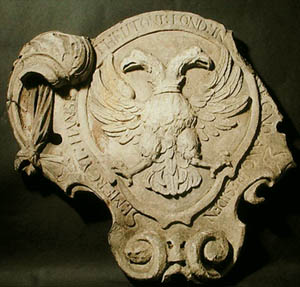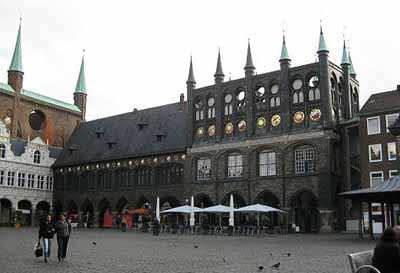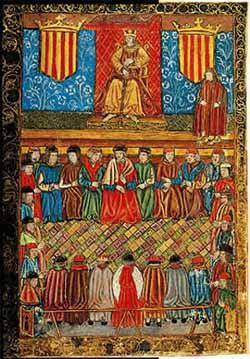 |
Organic Society
Monarchy, Aristocracy & Democracy - II
Theoretical and Practical Positions of the Church
Plinio Corrêa de Oliveira
I have developed and documented this topic more comprehensively in my book Revolution and Counter-Revolution. Briefly, what the Church teaches is that the three forms of government – monarchy, aristocracy and democracy – in principle are legitimate and conform to justice. Therefore, none is intrinsically bad.

Coat of arms of the Hanseatic League, a group of democratically governed city states |
She also teaches that, theoretically speaking, it is more efficient for the government of a State to be exercised by one person than by many because the former offers more unity and stability. A trivial example explains this teaching: Imagine a bus or a ship in which each passenger is entitled to tell the driver or commander where to go. It is not difficult to imagine that shortly the trip could become pandemonium. It is obvious that when just one man decides what to do and where to go, the bus or the ship stays on course and reaches its proper goal.
Likewise, according to Church teaching, when a good king governs, monarchy is the form of government that produces the best and most fruitful results. However, because of human weakness, St. Thomas teaches, monarchy is also where the abuse of power can most easily occur. Therefore, monarchy is good, but it is very frail. It is better to combine it with other forms of government, to include in it something of aristocracy and of democracy. When the three elements are mixed, this constitutes the more perfect form of government.
The pure aristocracy is also not a perfect form of government since it lacks a head. Neither is the pure democracy a perfect form, for it lacks both an elite and a head.
This theoretical analysis does not imply that, historically speaking, an aristocracy unmixed with any elements of democracy could not be successful, as it was, for instance, in Venice. The aristocratic system governed Venice so well that, despite not having a monarch and not being a democracy, that city-state became one of the great powers of Europe in the commercial and military realms.

The Hanseatic League Parliament in the city of Lubeck, north Germany |
There were also democracies that functioned very well. In the Middle Ages many plebeian free cities in the Holy Roman German Empire were governed by the common people, following a representative system. Various cities even allowed some women to have a vote in the decision-making process.
Many of these cities came to have great influence and power. For example, the cities of Bremen, Hamburg, Lubeck and Danzig formed the Hanseatic League, which was one of the great powers of Europe and played an important role on the international scene. These were democratic plebeian governments.
You can see that, depending on the different circumstances, any one of the three forms of government can produce good results. Such circumstances include the historical precedents of the country, its geographic configuration, the temperament of the people, their culture, their current needs, and so on. All these factors combine to suggest to a people the best form of government. The Church does not enter into the question of which form of government should be established in each country because that is not her mission. Her mission is to judge which forms are just or unjust and which one is the best theoretically speaking, which does not mean that it will always be the best form practically speaking for a country.

The Catalan Cortes meeting in the presence of the King, 15th century |
Indeed, if an absolute monarchy were instituted in Venice, it most probably would be disastrous. Likewise, if an aristocracy were to govern the city of Lubeck, most probably it would not succeed. Similarly, a democracy to govern the Holy Roman German Empire could well have ended badly. Even though in the speculative realm each of these forms is just, in concrete each one adjusts differently to the circumstances and ways of being of a country. So, the Church does not enter into this choice. She limits herself to define what is just and unjust, and lets the country make its own selection .
In the Middle Ages almost all the monarchies were mixed with the other forms of government. On one hand, there was the King who had the direct power to govern all his subjects; on the other hand, under him were feudal lords who had their own power and jurisdiction in which the King normally would not interfere. At the same time, many laws were generated by the customs of the people and the local chambers representing the cities.
Almost all monarchies had institutions similar to the English Parliament. In France there was the General Estates; in Spain and Portugal there was the Cortes, in Germany the assembly was called the Diet, which often gathered in the city of Worms. The latter was somewhat different from the others, but in France, Spain and Portugal those bodies were composed of representatives of the clergy, nobility and people who were convened by the king to give their opinion on certain matters regarding the common good of the country.
Continued

Posted November 10, 2010

  | | Prof. Plinio |
Organic Society was a theme dear to the late Prof. Plinio Corrêa de Oliveira. He addressed this topic on countless occasions during his life - at times in lectures for the formation of his disciples, at times in meetings with friends who gathered to study the social aspects and history of Christendom, at times just in passing.
Atila S. Guimarães selected excerpts of these lectures and conversations from the trancripts of tapes and his own personal notes. He translated and adapted them into articles for the TIA website. In these texts fidelity to the original ideas and words is kept as much as possible.

Related Topics of Interest
 Part I: Definitions, Examples, Nuances Part I: Definitions, Examples, Nuances
 A Participative Society A Participative Society
 What Is the Res Publica? What Is the Res Publica?
 How Intermediary Societies Participate in the State Power How Intermediary Societies Participate in the State Power
 Oligarchies and Modern Democracies Oligarchies and Modern Democracies
 The Organic Formation of a Region The Organic Formation of a Region
 Revolution and Counter-Revolution in the Tendencies, Ideas & Facts Revolution and Counter-Revolution in the Tendencies, Ideas & Facts
 Revolution and Counter-Revolution – Overview Revolution and Counter-Revolution – Overview

Related Works of Interest
|
|
Organic Society | Social-Political | Home | Books | CDs | Search | Contact Us | Donate

© 2002-
Tradition in Action, Inc. All Rights Reserved
|
 |
|